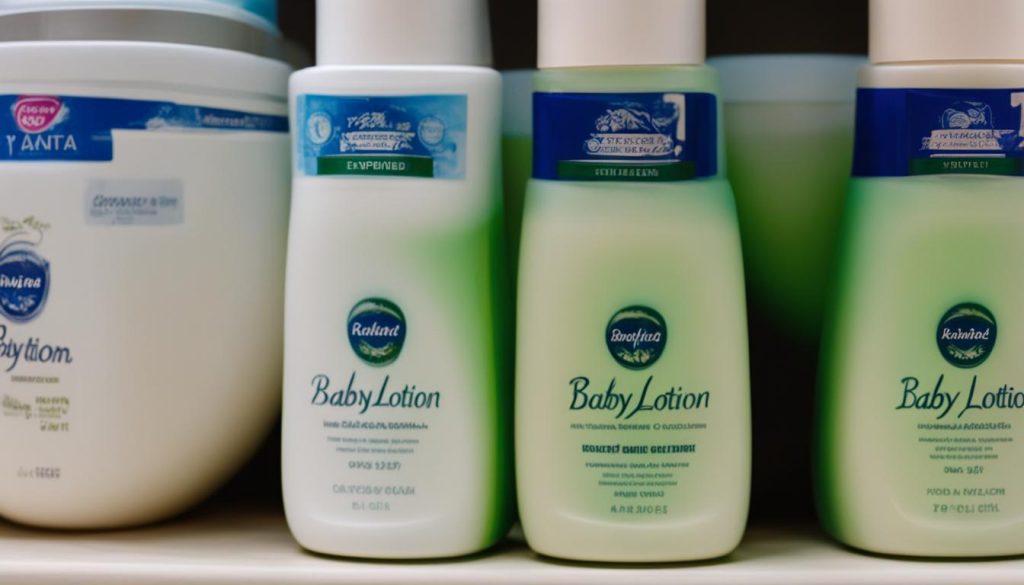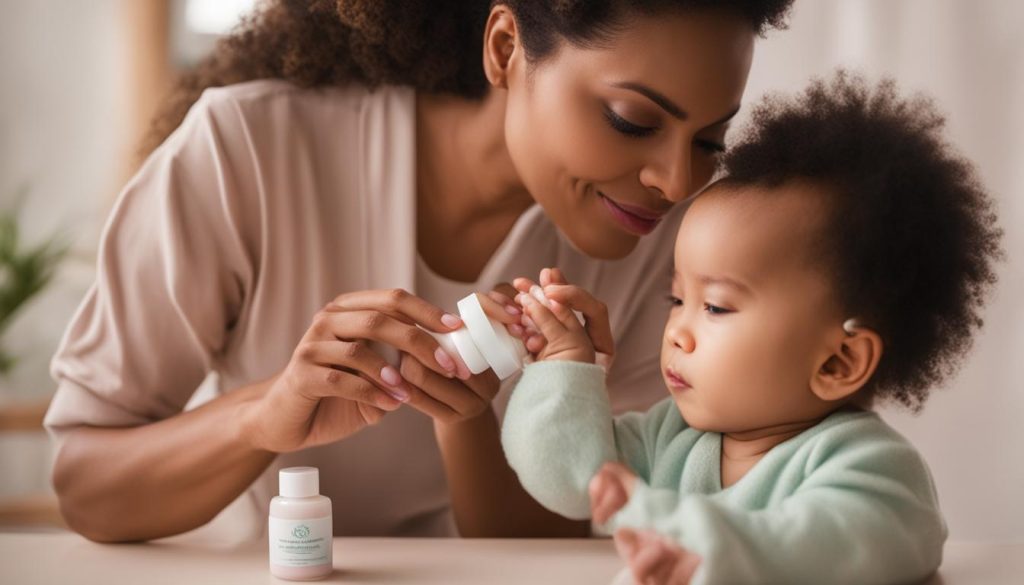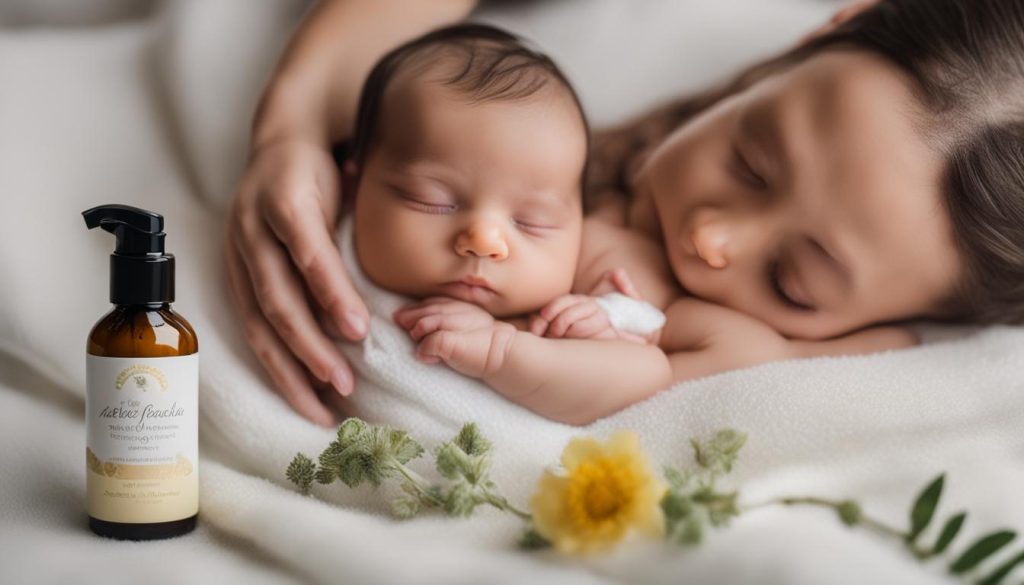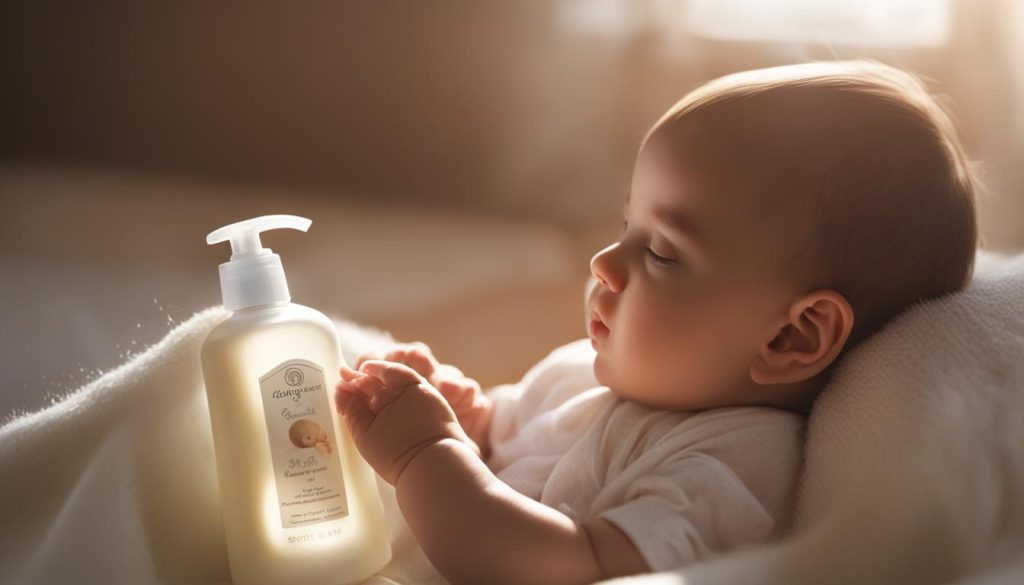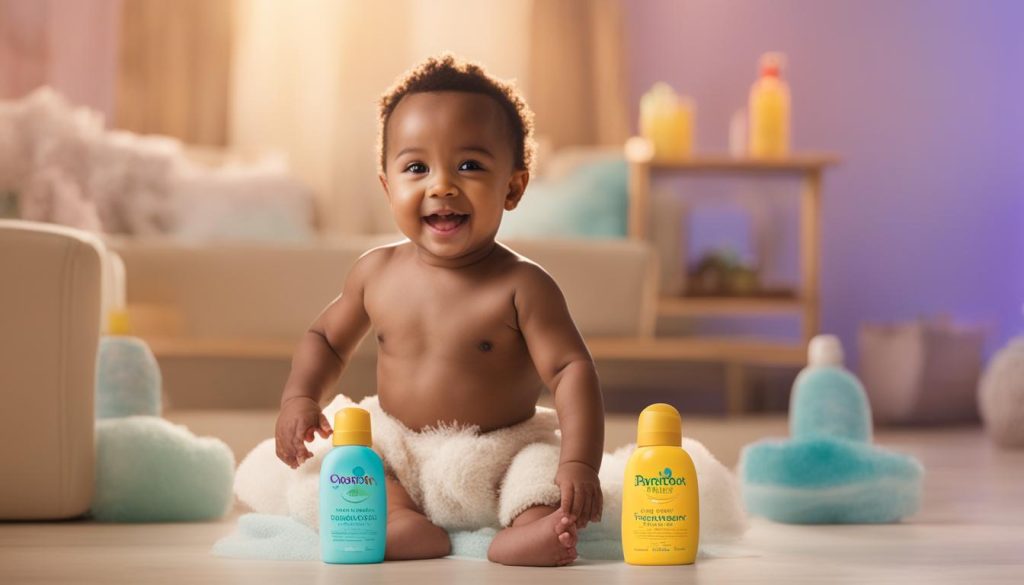Baby lotion, like any skincare product, has a shelf life. While there are no specific guidelines or expiration dates set by the FDA, it is important to know when your lotion may no longer be effective. Using expired lotion won’t necessarily cause harm, but it won’t provide the intended benefits either. Understanding the shelf life of baby lotion can help you make informed decisions about its usage and storage.
How long does baby lotion last? What is the expiry date of baby lotion? These are common questions that parents often have. Although the FDA does not require manufacturers to establish expiration dates for lotions, some may have suggested timeframes for use after opening, typically ranging from 12 to 24 months. Unopened lotions generally last longer than opened ones. It is advisable to discard any lotion that looks or smells bad, as the preservatives and other ingredients may have degraded, making the product less effective.
Proper storage is crucial for maintaining the effectiveness of baby lotion. Keep the lotion at or below room temperature and away from heat and light exposure. A cool cupboard is an ideal storage location. Heat and light can degrade the ingredients and promote bacterial and fungal growth. It is important to note that jarred lotions are more susceptible to contamination as they are exposed to the elements each time they are opened. To minimize the risk, use a fresh cosmetic stick or wash your hands before applying lotion from a jar.
While using expired baby lotion is not likely to cause harm, it may not provide the desired benefits. The active ingredients in the lotion may no longer be effective, resulting in decreased hydration and other intended outcomes. Additionally, jarred lotions that have expired may harbor bacteria, posing a potential risk. It is best to discard expired lotion and opt for a fresh product to ensure optimal efficacy.
To prolong the shelf life of baby lotion, follow these tips: purchase from reputable stores or manufacturers to ensure product freshness, avoid buying lotions without a seal to prevent product tampering, read expiration dates on sunscreens and other products, store lotions in a cool, dry place to minimize ingredient degradation, and contact the manufacturer for any specific questions about shelf life.
Baby lotion plays a crucial role in infant skincare. The gentle and moisturizing properties of baby lotion help keep the baby’s delicate skin hydrated, soft, and protected. It can help prevent and soothe dryness, irritation, and diaper rash. Incorporating baby lotion into a daily skincare routine can promote overall skin health and comfort for infants.
There are numerous baby lotion brands available on the market, each with its own set of ingredients and formulations. When choosing a baby lotion, consider factors such as the baby’s skin type, any specific skin concerns, and expert recommendations. Pediatricians can provide guidance on suitable brands and ingredients for baby lotions based on individual needs and preferences.
Dermatologists and skincare experts generally recommend using baby lotion as part of a regular skincare routine for infants. They emphasize the importance of choosing a lotion that is gentle, hypoallergenic, and free from harsh chemicals that may irritate the baby’s skin. Experts also advise using lotion after bath time to lock in moisture and provide essential hydration for the baby’s skin.
Baby lotion formulations cater to various skin types, including dry, sensitive, and normal skin. Some lotions are specifically designed for infants with eczema or other skin conditions. It is essential to choose a baby lotion that addresses the specific needs and concerns of the baby’s skin type. Consulting with a pediatrician can help determine the most suitable lotion for the baby’s unique skin requirements.
Pediatricians provide valuable recommendations for parents regarding baby skincare, including the use of baby lotion. They advise using a small amount of lotion after each bath to keep the baby’s skin moisturized and protected. Parents are encouraged to choose lotions that are gentle, hypoallergenic, and dermatologist-tested. Regular consultation with a pediatrician can ensure optimal skincare practices for infants.
Baby lotion is an essential component of infant skincare, providing hydration, protection, and comfort to the baby’s delicate skin. While there are no strict expiration guidelines for lotions, it is recommended to discard expired products to ensure optimal efficacy and to minimize the risk of contamination. Following proper storage practices, consulting experts, and considering individual skin needs can help parents provide the best care for their baby’s skin.
How Long Does Baby Lotion Last?
Baby lotion, like any skincare product, has a shelf life. While there are no specific guidelines or expiration dates set by the FDA, it is important to know when your lotion may no longer be effective. Using expired lotion won’t necessarily cause harm, but it won’t provide the intended benefits either. Understanding the shelf life of baby lotion can help you make informed decisions about its usage and storage.
The Lifespan of Baby Lotion
The lifespan of baby lotion can vary depending on the specific product and its ingredients. The FDA does not require manufacturers to establish expiration dates for lotions, but some may have suggested timeframes for use after opening, typically ranging from 12 to 24 months. Unopened lotions generally last longer than opened ones. It is advisable to discard any lotion that looks or smells bad, as the preservatives and other ingredients may have degraded, making the product less effective.
Proper Storage for Longevity
Proper storage is crucial for maintaining the effectiveness of baby lotion. Keep the lotion at or below room temperature and away from heat and light exposure. A cool cupboard is an ideal storage location. Heat and light can degrade the ingredients and promote bacterial and fungal growth. It is important to note that jarred lotions are more susceptible to contamination as they are exposed to the elements each time they are opened. To minimize the risk, use a fresh cosmetic stick or wash your hands before applying lotion from a jar.
| Product Type | Unopened | Opened |
|---|---|---|
| Lotion A | 24 months | 12 months |
| Lotion B | 18 months | 10 months |
| Lotion C | 20 months | 8 months |
Table: Shelf Life of Baby Lotions (in months)
While using expired baby lotion is not likely to cause harm, it may not provide the desired benefits. The active ingredients in the lotion may no longer be effective, resulting in decreased hydration and other intended outcomes. Additionally, jarred lotions that have expired may harbor bacteria, posing a potential risk. It is best to discard expired lotion and opt for a fresh product to ensure optimal efficacy.
Properly Storing Baby Lotion
Proper storage is crucial for maintaining the effectiveness of baby lotion. Follow these guidelines to ensure that your baby lotion remains fresh and effective for as long as possible:
- Store at or below room temperature: Baby lotion should be kept in a cool, dry place to prevent heat exposure. High temperatures can degrade the ingredients and reduce the lotion’s effectiveness.
- Avoid heat and light exposure: Keep the lotion away from direct sunlight and sources of heat, such as radiators or hot appliances. Light and heat can accelerate the breakdown of the lotion’s active ingredients.
- Choose a suitable storage location: An ideal place to store baby lotion is a cool cupboard or a cabinet away from the bathroom. Bathrooms tend to have high humidity levels, which can affect the longevity of the lotion.
- Prevent contamination: If using a jarred lotion, be mindful of the risk of contamination. Each time the jar is opened, it exposes the lotion to air, moisture, and potential bacteria. To minimize this risk, consider using a fresh cosmetic stick or washing your hands before applying lotion from a jar.
By following these storage practices, you can help extend the shelf life of your baby lotion and ensure that it remains effective for your little one’s skincare needs.
“Proper storage is crucial for maintaining the effectiveness of baby lotion.”
Table: Storage Tips for Baby Lotion
| Storage Tip | Description |
|---|---|
| Store at or below room temperature | Keep the lotion in a cool, dry place to prevent heat exposure and ingredient degradation. |
| Avoid heat and light exposure | Keep the lotion away from direct sunlight and heat sources to protect its active ingredients. |
| Choose a suitable storage location | Store the lotion in a cool cupboard or cabinet away from high humidity areas like bathrooms. |
| Prevent contamination | Use a fresh cosmetic stick or wash hands before applying lotion from a jar to minimize the risk of bacterial contamination. |
Can Expired Baby Lotion Be Used?
Using expired baby lotion may not provide the desired benefits and can pose certain risks. When a baby lotion expires, the active ingredients may no longer be effective, leading to decreased hydration and other intended outcomes. This can result in the baby’s skin not receiving the nourishment it needs, potentially causing dryness and irritation.
Furthermore, expired lotions, especially those in jars, may have a higher risk of bacterial and fungal contamination. As the preservatives and other ingredients degrade over time, the lotion becomes more susceptible to harboring harmful microorganisms. Applying expired lotion could potentially lead to skin infections or other adverse reactions.
Therefore, it is best to discard expired baby lotion and opt for a fresh product. This ensures that the lotion is still effective in providing the necessary hydration and protection for your baby’s delicate skin. Remember to always check the expiration date on baby lotion before using it to ensure its quality and efficacy.
Table: Risks of Using Expired Baby Lotion
| Risks | Description |
|---|---|
| Decreased efficacy | Expired lotion may not provide the desired benefits, resulting in decreased hydration and potential skin issues. |
| Contamination | Expired jarred lotions may harbor bacteria and fungi, increasing the risk of skin infections or adverse reactions. |
| Potential skin irritation | The degradation of ingredients in expired lotion could cause skin dryness, irritation, or allergic reactions. |
In summary, it is crucial to avoid using expired baby lotion due to its reduced effectiveness and potential risks. Discarding expired lotion and replacing it with a fresh product ensures that your baby’s skin receives the necessary care and protection it needs.
Tips for Extending the Shelf Life of Baby Lotion
Properly storing baby lotion is essential for maintaining its effectiveness and extending its shelf life. Here are some tips to help you make your baby lotion last longer:
- Choose reputable brands: Purchase baby lotion from trusted stores or manufacturers to ensure product freshness. Reputable brands are more likely to have proper manufacturing processes and quality control.
- Check for seals: Avoid buying lotions without a seal. Seals help prevent product tampering and ensure that the lotion is in good condition when you purchase it.
- Read expiration dates: Always check the expiration dates on baby lotion bottles. Using lotions past their expiration dates may reduce their effectiveness.
- Store in a cool, dry place: Keep baby lotion in a cool, dry location to minimize ingredient degradation. High temperatures can cause the lotion to break down and become less effective.
- Contact the manufacturer: If you have specific questions about the shelf life of a particular baby lotion, reach out to the manufacturer for more information.
By following these tips, you can ensure that your baby lotion remains fresh and effective for as long as possible. Taking proper care of your baby lotion will help you get the most out of each bottle and provide optimal skincare for your little one.
Table: Comparing Storage Tips for Baby Lotion
| Storage Tip | Description |
|---|---|
| Choose reputable brands | Purchase baby lotion from trusted stores or manufacturers to ensure product freshness. |
| Check for seals | Avoid buying lotions without a seal to prevent product tampering and ensure lotion quality. |
| Read expiration dates | Always check the expiration dates on baby lotion bottles to use them before they expire. |
| Store in a cool, dry place | Keep baby lotion in a cool and dry location to prevent ingredient degradation. |
| Contact the manufacturer | Reach out to the manufacturer for specific information about the shelf life of a particular baby lotion. |
Importance of Infant Skincare
Skincare for babies is an essential aspect of their overall well-being. The delicate nature of their skin requires special attention and care. Baby lotion plays a crucial role in maintaining the health and hydration of their skin, making it an integral part of their skincare routine.
The gentle and moisturizing properties of baby lotion help to keep the baby’s skin hydrated, soft, and protected. It forms a barrier on the skin’s surface, preventing moisture loss and locking in essential hydration. Regular application of baby lotion can help prevent dryness, irritation, and diaper rash, providing comfort and soothing relief for the baby.
Furthermore, incorporating baby lotion into a daily skincare routine can promote overall skin health. It nourishes the skin with essential nutrients and vitamins, helping to strengthen its natural protective barrier. Baby lotion also aids in maintaining the skin’s pH balance, preventing any disruptions that may lead to sensitivity or other skin issues.
Overall, baby lotion is an indispensable component of infant skincare. Its gentle formulation, moisturizing properties, and protective benefits make it an excellent choice for keeping your baby’s skin healthy, hydrated, and comfortable.
The Importance of Baby Lotion in Skincare Routine
Incorporating baby lotion into your baby’s skincare routine is crucial for several reasons:
- Hydration: Baby lotion helps to hydrate the baby’s skin, preventing dryness and maintaining moisture levels.
- Protection: The moisturizing properties of baby lotion create a protective barrier, shielding the baby’s skin from external irritants.
- Comfort: Regular application of baby lotion can soothe and calm the baby’s skin, providing relief from itching, redness, and irritation.
- Nourishment: Baby lotion nourishes the skin with essential nutrients, vitamins, and natural ingredients, promoting overall skin health.
- Skin Barrier: Baby lotion helps to strengthen the skin’s natural protective barrier, reducing the risk of sensitivity and other skin issues.
By incorporating baby lotion into your baby’s skincare routine, you can ensure that their delicate skin remains healthy, hydrated, and protected.
Comparing Baby Lotion Brands
When it comes to choosing a baby lotion, there are numerous brands available on the market, each offering its own set of ingredients and formulations. It’s important for parents to make an informed decision by considering factors such as the baby’s skin type, any specific skin concerns, and expert recommendations. Pediatricians can provide valuable guidance on suitable brands and ingredients for baby lotions based on individual needs and preferences.
Here is a comparison of some popular baby lotion brands:
| Brand | Main Ingredients | Pediatric Recommendation |
|---|---|---|
| Brand A | Natural oils, shea butter, chamomile | Recommended for sensitive skin |
| Brand B | Organic calendula extract, jojoba oil | Hypoallergenic and dermatologist-tested |
| Brand C | Oatmeal, glycerin, vitamin E | Recommended for dry skin |
| Brand D | Coconut oil, aloe vera, lavender | Gentle formula for daily use |
It’s worth noting that the choice of baby lotion may vary depending on personal preferences and the baby’s specific skin needs. Some parents may opt for fragrance-free lotions, while others may prefer lotions with a mild scent. Ultimately, it’s important to choose a brand that aligns with both the baby’s skin requirements and the parent’s preferences.
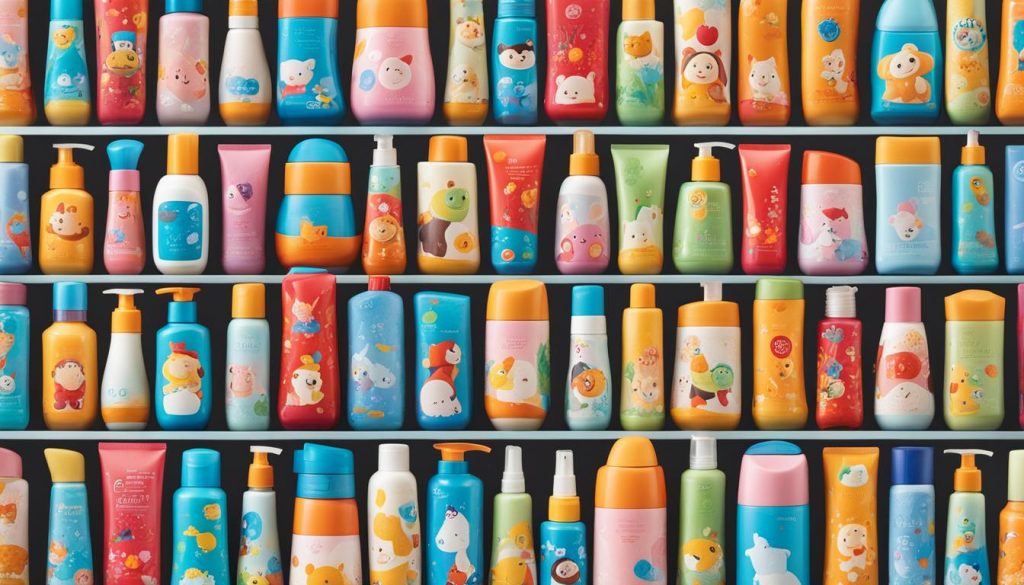
Expert Opinions on Baby Lotion
When it comes to using baby lotion, dermatologists and skincare experts offer valuable insights and recommendations. They stress the importance of selecting a lotion that is gentle, hypoallergenic, and free from harsh chemicals that may irritate a baby’s delicate skin. Applying baby lotion after bath time can help lock in moisture and provide essential hydration for the skin.
“Baby lotion can be beneficial for infants, as it helps keep their skin moisturized and protected,” says Dr. Emily Johnson, a renowned dermatologist specializing in pediatric skincare. “Choosing a lotion that is specifically formulated for babies, with ingredients such as aloe vera and chamomile, can provide soothing and nourishing properties.”
Dermatologists recommend avoiding lotions with fragrances, artificial dyes, and excessive preservatives, as these can potentially cause irritation or allergic reactions. It’s also important to apply the lotion gently, using light strokes to avoid rubbing or scrubbing the baby’s delicate skin.
Dr. Sarah Thompson, a pediatric dermatologist, adds, “Parents should consult with their pediatrician if they have concerns about which baby lotion to use. Each baby’s skin is unique, and a healthcare professional can provide personalized guidance based on the baby’s skin type and any existing skin conditions. Regular check-ups and discussions with a pediatrician are essential for maintaining healthy and well-nourished skin in infants.”
By following the recommendations of dermatologists and skincare experts, parents can ensure they are using the right baby lotion for their little one’s needs. Consulting with professionals and using gentle, hypoallergenic lotions can promote healthy and nourished skin, providing comfort and protection for babies.
Addressing Different Skin Types with Baby Lotion
When it comes to caring for your baby’s skin, it’s important to choose a lotion that is tailored to their specific needs. Baby lotion formulations are designed to address various skin types, including dry, sensitive, and normal skin. By understanding your baby’s skin type and selecting the right lotion, you can provide optimal care and protection for their delicate skin.
Baby Lotion for Dry Skin
If your baby has dry skin, consider using a baby lotion that is specially formulated to provide deep hydration and nourishment. Look for lotions that contain moisturizing ingredients like shea butter, cocoa butter, or natural oils such as almond oil or coconut oil. These ingredients help to replenish and lock in moisture, keeping your baby’s skin soft and supple.
Baby Lotion for Sensitive Skin
For babies with sensitive skin, it’s important to choose a lotion that is gentle and free from harsh chemicals or fragrances that may cause irritation. Look for lotions that are hypoallergenic and dermatologist-tested. These lotions are formulated to minimize the risk of allergic reactions and are generally safe for babies with sensitive skin.
Lotion for Different Skin Types
Baby lotions are also available for babies with normal skin. These lotions provide gentle hydration and protection without causing any irritation. If your baby has a specific skin condition, such as eczema, there are lotions specifically designed to help soothe and alleviate symptoms. Consult with your pediatrician or dermatologist to determine the most suitable lotion for your baby’s unique skin requirements.
Remember, every baby is different, and what works for one may not work for another. It’s essential to observe your baby’s skin and monitor any reactions or changes. If you notice any adverse effects or if your baby’s skin condition worsens, consult with a healthcare professional for further guidance.
Pediatric Recommendations for Baby Skincare
When it comes to taking care of your baby’s skin, pediatricians offer valuable recommendations to ensure optimal skincare practices. By following these best practices, parents can keep their baby’s skin healthy, moisturized, and protected.
1. Keep the skin moisturized:
Pediatricians advise using a small amount of gentle, hypoallergenic baby lotion after each bath to lock in moisture and prevent dryness. It is important to choose a lotion specifically formulated for babies, as their delicate skin requires extra care and attention.
2. Choose safe and dermatologist-tested products:
Pediatricians recommend selecting baby lotions that are dermatologist-tested and free from harsh chemicals that may irritate the baby’s skin. Opting for products with natural and organic ingredients can provide added peace of mind for parents.
3. Follow proper application techniques:
When applying baby lotion, it is essential to use gentle, circular motions to massage the lotion into the baby’s skin. This promotes absorption and enhances the moisturizing benefits of the lotion. Be sure to pay extra attention to areas prone to dryness, such as the elbows, knees, and diaper area.
4. Consult with your pediatrician:
Every baby is unique, and their skincare needs may vary. It is always advisable to consult with your pediatrician for personalized recommendations and advice. They can provide guidance on specific products, skincare routines, and any concerns you may have regarding your baby’s skin health.
By following these pediatric recommendations, parents can create a nurturing skincare routine for their baby. Remember, every baby’s skin is different, so it is essential to listen to your pediatrician’s advice and make adjustments as needed. With proper care and attention, your baby’s skin can stay soft, healthy, and protected.
The Bottom Line – Taking Care of Baby’s Skin
When it comes to taking care of your baby’s skin, incorporating a proper skincare routine is essential. Baby lotion is an important component of this routine as it provides much-needed hydration, protection, and comfort to your little one’s delicate skin. However, it’s crucial to be mindful of the expiration of baby lotion to ensure its efficacy and minimize any potential risks.
While there are no strict guidelines for lotion expiration, it is advisable to discard expired products. Using expired baby lotion won’t harm your baby, but it may not provide the desired benefits. The active ingredients in the lotion may have degraded over time, resulting in decreased hydration and other intended outcomes. Additionally, jarred lotions that have expired may harbor bacteria, posing a potential risk to your baby’s skin.
To maintain the effectiveness of baby lotion, proper storage is crucial. Keep the lotion at or below room temperature and away from heat and light exposure. Storing lotions in a cool, dry place can help minimize ingredient degradation and prevent the growth of bacteria or fungi. Always remember to use a fresh cosmetic stick or wash your hands before applying lotion from a jar to minimize contamination.
In conclusion, by following a proper skincare routine, including the use of baby lotion, you can provide the best care for your baby’s skin. Discarding expired products, storing lotions correctly, and considering your baby’s individual skin needs are essential steps in ensuring optimal skincare practices. Consult with pediatricians and experts for further guidance on the most suitable products and routines for your baby.
FAQ
Does baby lotion expire?
Baby lotion, like any skincare product, has a shelf life. While there are no specific guidelines or expiration dates set by the FDA, it is important to know when your lotion may no longer be effective.
How long does baby lotion last?
The lifespan of baby lotion can vary depending on the specific product and its ingredients. The FDA does not require manufacturers to establish expiration dates for lotions, but some may have suggested timeframes for use after opening, typically ranging from 12 to 24 months.
How should baby lotion be properly stored?
Proper storage is crucial for maintaining the effectiveness of baby lotion. Keep the lotion at or below room temperature and away from heat and light exposure. A cool cupboard is an ideal storage location.
Can expired baby lotion be used?
While using expired baby lotion is not likely to cause harm, it may not provide the desired benefits. The active ingredients in the lotion may no longer be effective, resulting in decreased hydration and other intended outcomes.
What are some tips for extending the shelf life of baby lotion?
To prolong the shelf life of baby lotion, follow these tips: purchase from reputable stores or manufacturers to ensure product freshness, avoid buying lotions without a seal to prevent product tampering, read expiration dates on sunscreens and other products, store lotions in a cool, dry place to minimize ingredient degradation, and contact the manufacturer for any specific questions about shelf life.
What is the importance of infant skincare?
Baby lotion plays a crucial role in infant skincare. The gentle and moisturizing properties of baby lotion help keep the baby’s delicate skin hydrated, soft, and protected. It can help prevent and soothe dryness, irritation, and diaper rash.
Which baby lotion brands should I consider?
There are numerous baby lotion brands available on the market, each with its own set of ingredients and formulations. When choosing a baby lotion, consider factors such as the baby’s skin type, any specific skin concerns, and expert recommendations.
What do experts say about using baby lotion?
Dermatologists and skincare experts generally recommend using baby lotion as part of a regular skincare routine for infants. They emphasize the importance of choosing a lotion that is gentle, hypoallergenic, and free from harsh chemicals that may irritate the baby’s skin.
How does baby lotion address different skin types?
Baby lotion formulations cater to various skin types, including dry, sensitive, and normal skin. Some lotions are specifically designed for infants with eczema or other skin conditions. It is essential to choose a baby lotion that addresses the specific needs and concerns of the baby’s skin type.
What recommendations do pediatricians have for parents?
Pediatricians provide valuable recommendations for parents regarding baby skincare, including the use of baby lotion. They advise using a small amount of lotion after each bath to keep the baby’s skin moisturized and protected.
What is the bottom line when it comes to taking care of baby’s skin?
Baby lotion is an essential component of infant skincare, providing hydration, protection, and comfort to the baby’s delicate skin. While there are no strict expiration guidelines for lotions, it is recommended to discard expired products to ensure optimal efficacy and to minimize the risk of contamination.

